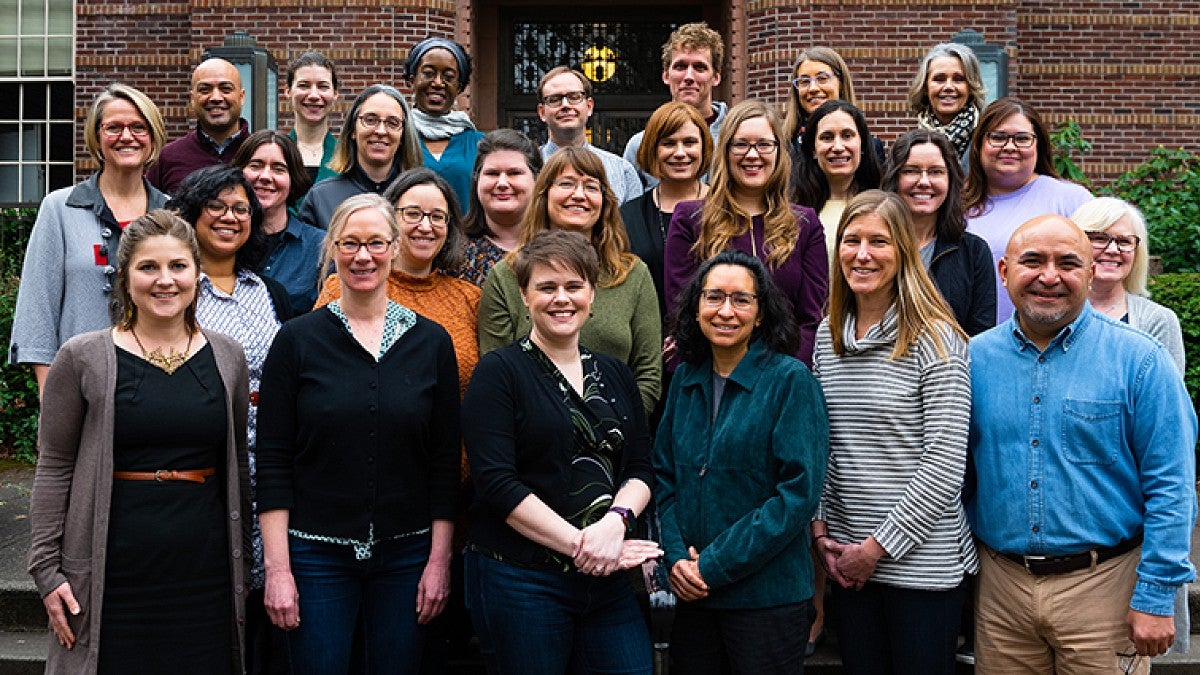The University of Oregon’s effort to invest in effective leaders was on display recently with the graduation of the second class from the UO Leadership Academy.
Launched two years ago by the Office of the Provost, the Leadership Academy gives UO faculty members and staff a chance to hone skills that help them work with people and lead change. The 30-person class spent a year learning, discussing and practicing the qualities of leadership.
“We are helping folks unlearn some of the unhealthy, outdated and rigid models of organizational leadership,” said Chris Ruiz de Esparza, director of diversity, inclusion, and leadership development in the School of Law and one of the program organizers. “We are cultivating fresh conversations that weave leadership with identity, emotional intelligence, equity and inclusion, vulnerability, authenticity, feedback and conflict.”
The program offers monthly training sessions on transformational leadership to administrative and academic leaders selected through a competitive application process. Using current research and evidence-based scholarship, sessions focus on nurturing inclusivity, harnessing personal strengths and building strong relationships.
“One of the main aspects of the program was the vital emphasis on building and sustaining genuine, empathetic and transformative relationships at individual, team and organizational levels,” said class member Angel Dorantes, an academic adviser in the College of Education. “My goal is to sustain and enhance personally meaningful relationships with students, team members, and faculty and staff across campus.”
As with all classes and most university operations, the Leadership Academy also went remote this spring, and the recent graduation ceremony had to be held on Zoom. But the coronavirus pandemic provided a unique learning opportunity for participants.
Class member Rachel Todd, director of the Oregon Executive MBA program in the Lindquist College of Business, learned the value of taking the time to pause and listen to herself and others during times of crisis.
“The Leadership Academy provided me with a language and tools to dive deeper into relationships without fear,” she said. “Humans crave true and meaningful connection, and while we must be physically distant from one another during this time, people are using creativity and innovation to find ways to connect.”
For Larissa Ennis, associate director of sponsorships and community relations in Government and Community Relations, being forced to go remote shed light on the camaraderie that had developed within the cohort.
“I had come to greatly enjoy and rely on spending time with my cohort as a respite from the day-to-day,” she said. “It was really restorative for me to be in community with others who have diverse skills and interests but are all here for the same purpose: to make UO better and stronger.”
Given the unique challenges that face the institution on campus and beyond this year, the Leadership Academy’s purpose to equip and empower leaders is more important than ever, organizers said.
“These Leadership Academy graduates will serve as colleagues who can mobilize and inspire teams, resolve conflicts, spark innovative thinking and creative problem-solving, and who can role model resilient leadership,” said Jennifer Espinola, dean of students for the School of Law and another of the program organizers. “These are exceptional people who give me confidence that we will persevere.”
—By Caitlin Howard, University Communications


